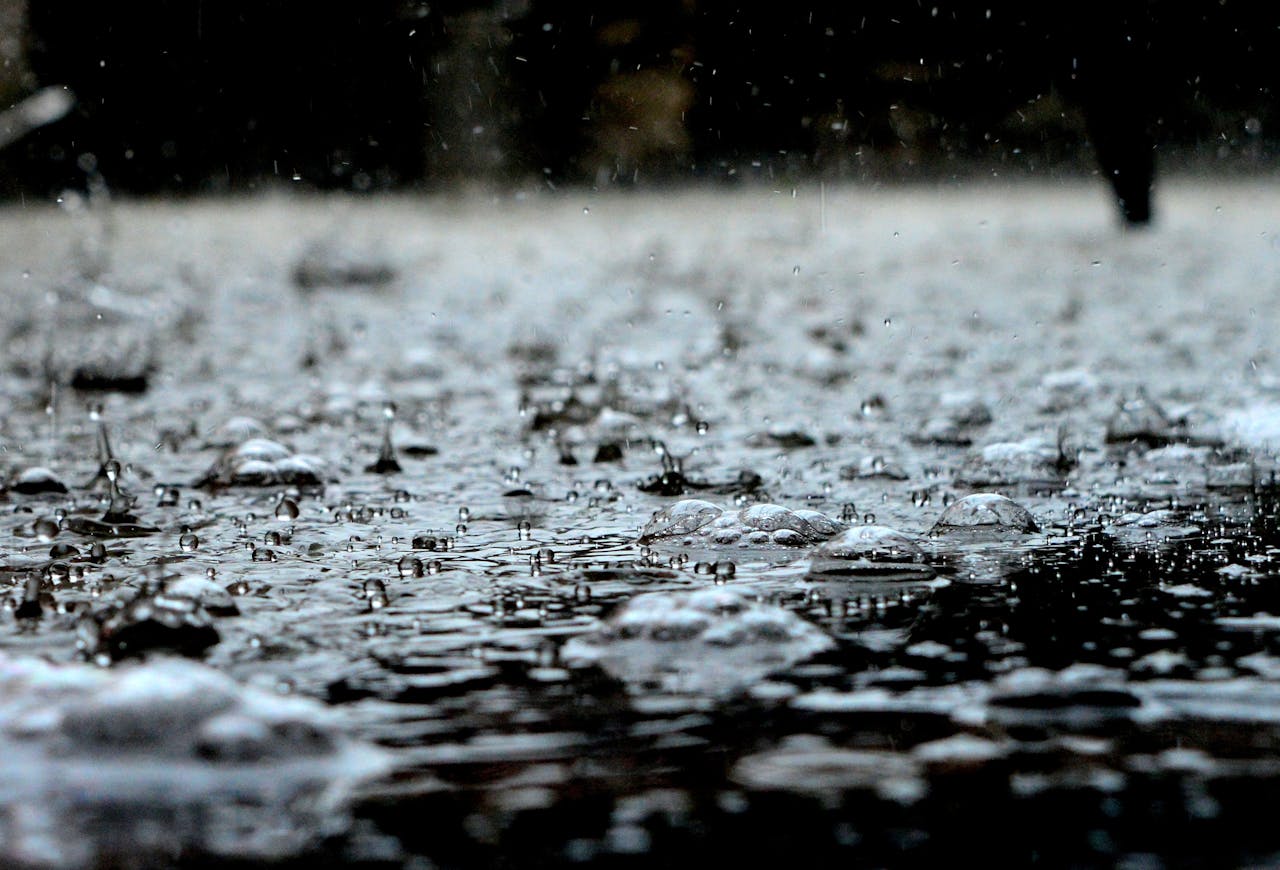
In the Name of Allah—the Most Compassionate, Most Merciful.
Rain in Islam is more than a weather event.
It’s a time when the heavens are open, and duas are accepted. According to authentic hadiths, the moment of rainfall is among the sacred times when Allah (سُبْحَانَهُ وَتَعَالَىٰ) listens to the supplications of His servants.
Muslims are encouraged to make dua when it rains, asking for mercy, guidance, and blessings.
The Prophet (ﷺ) would raise his hands and pray during rainfall. This practice reflects the spiritual significance of rain—physically nourishing and spiritually purifying.
Why Is Rain Considered a Blessing in Islam?
Rain is described as rahmah (mercy) in the Qur’an. Surah An-Nur (24:43) speaks of how Allah (سُبْحَانَهُ وَتَعَالَىٰ) sends down rain to revive the earth. It brings growth, sustenance, and spiritual reflection.
The Prophet (ﷺ) used to step outside, letting the rain touch his skin, saying it came freshly from his Lord. The Islamic view sees rain not as random, but as a direct sign from Allah (سُبْحَانَهُ وَتَعَالَىٰ). It reminds the believer of divine mercy.
What Did the Prophet (ﷺ) Say About Rain?
The Prophet Muhammad (ﷺ) linked rain to Allah (سُبْحَانَهُ وَتَعَالَىٰ)’s mercy. A hadith in Sahih al-Bukhari mentions that the Prophet said,
The Prophet (ﷺ) emphasised optimism, even when clouds gathered. His actions during the rain were filled with gratitude and humility.
Islam teaches that rain reflects Allah (سُبْحَانَهُ وَتَعَالَىٰ) ‘s forgiveness, much like how water washes away impurities.
What Are the Authentic Duas for When It Rains?
There are several authentic duas to recite during rainfall.
The most common dua when it rains is:
Transliteration: Allahumma sayyiban naafi’an
Translation: “O Allah, let it be beneficial rain.”
Another powerful dua from the Prophet (ﷺ) during heavy rain is:
Translation: “O Allah (سُبْحَانَهُ وَتَعَالَىٰ), around us and not upon us.”
Transliteration: Allah (سُبْحَانَهُ وَتَعَالَىٰ)umma hawalayna wa la ‘alayna
These duas show the Islamic balance—welcoming rain with joy but also praying for safety from destructive floods.
Dua When Rain Begins
When the first drops fall, Muslims should quietly utter:
Transilieration: Mutirna bifadhlillahi wa rahmatihi
Translation: We have received rain from Allah’s bounty and mercy.
Source: (Sahih Al-Bukhari)
This brief supplication reflects gratitude and a plea for benefit. It’s a moment to pause and recognise the mercy of Allah (سُبْحَانَهُ وَتَعَالَىٰ).
According to Hadith, even a single word said at the start of rain carries value. The Prophet’s (ﷺ) action was to step outside, raise his hands, and make dua.
Dua During Rainfall
As the rain continues, hearts soften. It is a sacred time to ask Allah (سُبْحَانَهُ وَتَعَالَىٰ) for everything—guidance, forgiveness, healing, or provision.
Translation: “O Allah (سُبْحَانَهُ وَتَعَالَىٰ), forgive me, have mercy on me, and provide for me.”
Transliteration: Allah (سُبْحَانَهُ وَتَعَالَىٰ)ummaghfir li warhamni warzuqni
In Islamic teachings, falling rain symbolises descending mercy. Every drop is a chance to seek forgiveness and protection.
Muslims often use Hisnul Muslim apps or booklets to access these supplications.
Dua After It Stops Raining
When the rain ceases, it’s Sunnah to express thanks:
Translation: “We have been given rain by the grace and mercy of Allah (سُبْحَانَهُ وَتَعَالَىٰ).”
Transliteration: Mutirna bifadhlillahi wa rahmatihi
This dua acknowledges Allah (سُبْحَانَهُ وَتَعَالَىٰ) as the source. It builds the habit of gratitude.
The Prophet (ﷺ) never took rain lightly; he taught his ummah to remain spiritually aware even after the clouds pass.
Other Recommended Supplications During Rain
Rain is a powerful time to recite other duas from the Qur’an and Sunnah:
- رَبَّنَا آتِنَا فِي الدُّنْيَا حَسَنَةً (Surah Al-Baqarah 2:201)
- اللَّهُمَّ اشْفِ مَرْضَانَا – for healing
- اللَّهُمَّ إِنِّي أَسْأَلُكَ الْهُدَى وَالتُّقَى – for guidance
These supplications remind Muslims to make the most of this moment of descending mercy.
Why Is Dua More Likely to Be Accepted When It Rains?
The Prophet (ﷺ) mentioned that certain times exist when du’as are not rejected—one of them is during rain.
The barrier between a servant and their Lord becomes thinner.
Just like Laylatul Qadr during Ramadan, rainfall is a moment of divine closeness.
A believer should seize this blessed window and ask freely, whether for themselves or others.
What Actions Are Recommended During Rainfall?
The Prophet (ﷺ) would uncover part of his garment to let the rain touch him.
He praised Allah (سُبْحَانَهُ وَتَعَالَىٰ) during rain and stayed mindful.
Muslims are encouraged to pause, reflect, and seek forgiveness during rainfall. Even staying indoors and listening to the sound of rain can be a form of dhikr if the heart is engaged.
What If the Rain Is Too Much or Destructive?
While rain is mercy, excessive rain can bring hardship. Islam offers balanced guidance. The Prophet (ﷺ) never rejected rain but sought moderation and safety through dua.
Dua for Protection from Harmful Rain
Translation: “O Allah (سُبْحَانَهُ وَتَعَالَىٰ), around us and not upon us.”
Transliteration: Allah (سُبْحَانَهُ وَتَعَالَىٰ)umma hawalayna wa la ‘alayna
This dua was recited by the Prophet (ﷺ) during storms or heavy flooding. It shows Islam’s approach—welcoming mercy, seeking protection from harm.
How to Thank Allah (سُبْحَانَهُ وَتَعَالَىٰ) for Rain?
Gratitude is central in Islam. Saying “Alhamdulillah” (الحمد لله) after rain is a simple and powerful act.
You can also pray two rak’ahs in gratitude. Allah (سُبْحَانَهُ وَتَعَالَىٰ) says in the Qur’an:
Whether you’re at home, outside, or using the Hisnul Muslim app, express thanks for this divine blessing.
FAQs
Conclusion – Dua When It Rains
Rain is a time of reflection, prayer, and divine mercy. The Prophet (ﷺ) transformed rainfall into moments of worship.
Whether you’re using the Hisnul Muslim app or reciting from memory, the goal is to connect deeply with Allah (سُبْحَانَهُ وَتَعَالَىٰ) (سُبْحَانَهُ وَتَعَالَى).
The next time it rains, pause. Turn your face to the sky. Whisper a dua. And trust that Allah (سُبْحَانَهُ وَتَعَالَىٰ) is listening.






